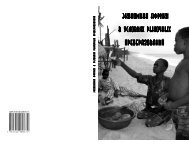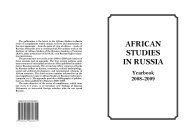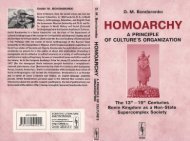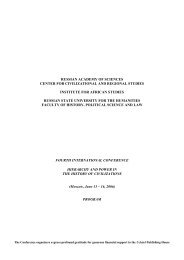L. Fituni, I. Abramova Resource Potential of Africa and Russia's ...
L. Fituni, I. Abramova Resource Potential of Africa and Russia's ...
L. Fituni, I. Abramova Resource Potential of Africa and Russia's ...
Create successful ePaper yourself
Turn your PDF publications into a flip-book with our unique Google optimized e-Paper software.
exploitation <strong>of</strong> projects. Soviet exports <strong>of</strong> equipment <strong>and</strong> materials<br />
for the construction <strong>of</strong> complete enterprises amounted to 339 million<br />
rubles in 1961–1965; 444 million rubles in 1966–1970; 553 million<br />
rubles in 1971–1975; 894 million rubles in 1976–1980 <strong>and</strong> to 2,2<br />
billion rubles in 1989. 6<br />
Moscow prided itself for having undermined the monopoly <strong>of</strong><br />
industrial capitalist countries on the sales <strong>of</strong> machines <strong>and</strong> equipment,<br />
transfer <strong>of</strong> technical knowledge <strong>and</strong> granting <strong>of</strong> credits to developing<br />
countries <strong>of</strong> <strong>Africa</strong>. And indeed, maneuvering between the<br />
West <strong>and</strong> the East <strong>Africa</strong>n countries were able to negotiate better<br />
terms or relations with the developed world. Under the conditions <strong>of</strong><br />
global ideological competitions between communist <strong>and</strong> capitalism,<br />
<strong>and</strong> due to the impact <strong>of</strong> the economic cooperation between the<br />
USSR <strong>and</strong> other socialist states <strong>and</strong> the developing countries, western<br />
powers had, in some instances, to agree to lower interest on<br />
credits granted to the developing countries.<br />
Though Soviet companies <strong>of</strong>ten were losing on overall investment<br />
competition <strong>and</strong> scale <strong>of</strong> purchases <strong>of</strong> <strong>Africa</strong>n goods (especially<br />
those, which usually were not considered to be <strong>of</strong> higher order<br />
<strong>of</strong> necessity for the Soviet consumers – exotic fruit, expensive types<br />
<strong>of</strong> timber etc), Moscow could <strong>of</strong>fer for <strong>Africa</strong>ns business benefits <strong>of</strong><br />
its own. One <strong>of</strong> them was long term nature <strong>and</strong> predictability <strong>of</strong><br />
terms <strong>and</strong> conditions <strong>of</strong> mutual cooperation. Another important aspect<br />
<strong>of</strong> <strong>Africa</strong>n countries ’ economic cooperation with the Soviet Union<br />
was its stability. This was determined by the planned nature <strong>of</strong><br />
the Soviet national economy <strong>and</strong> by the fact that the agreements<br />
signed by the USSR with <strong>Africa</strong>n states were long-term ones. Stable<br />
cooperation enabled <strong>Africa</strong>n countries to envisage Soviet assistance<br />
in building major projects in the key branches <strong>of</strong> their economies not<br />
only in their current but also in their long-term national economic<br />
development plans-A greater part <strong>of</strong> all the assistance rendered by<br />
the USSR to <strong>Africa</strong>n states went to the countries <strong>of</strong> socialist orientation.<br />
They displayed initiative <strong>and</strong> readiness to develop multilateral<br />
<strong>and</strong> ever deepening cooperation with the Soviet Union in all<br />
branches <strong>of</strong> their economies <strong>and</strong> create the necessary requisites for<br />
it. At the same time, cooperation successfully developed with a<br />
143







